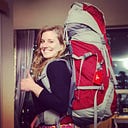No Stupid Injuries: The Eclipse & Your Eyes
TL;DR: Really do use approved protective eyewear, or just don’t view it live. NASA has you covered with online viewing. Oh, kids & pets are susceptible too, so don’t forget to guard their eyes as well.
I’ve been wondering why the solar eclipse is supposed to be so dangerous for us to look at when we see the sun and moon, you know, every day.
Thanks to Google and reading a few articles (including an astronomy post by my alma mater Williams College) about the topic, I’ve got a layman’s terms explanation:
- Looking at the sun would pretty much (sun)burn your eye any time.
- At non-eclipse times (aka always), your brain knows this is bad so actually even when you think you’re looking directly at the sun, your eye is disregarding your dumb self-harming desire and bopping around a bit. (You can tell because the afterimage when you close your eyes is a sun in a bunch of places = not burning your cornea and retina.)
- But that only works when it’s the same old sun we’re used to, a boring big blob of fire in the sky. During a solar eclipse, suddenly it’s interesting! Now our curious little brains are looking at a specific shape, focusing on what is happening. No more wiggling around for our eyes, and thanks to that focus on the shape = retinal burning & vision damage.
Also, if you look at the sun during the day, it’s… bright out. Our eyes are already adjusted to the light. But during an eclipse, it’s now dark outside, so our pupils are dilated and allowing in as much light as possible = burn, baby, burn.
It’s interesting and seems important to note that our eyes don’t have pain receptors, so unlike the immediately unpleasant sensation of sticking our hand onto a hot stove, our eyes can go and roast themselves away without anything ringing the warning bells that BAD THINGS ARE HAPPENING STOP NOW.
Also, unlike our skin, which handily grows back: once retina tissue is destroyed, it cannot regenerate. You only get 2 eyes, folks. Not the time to test their tanning threshold.
Like many things, younger and less developed eyes are more at risk than our already kinda jaded over 30 eyes. (That doesn’t make it safe for us, though.)
There is a brief (few minutes) moment that is safe to look during the absolute and total eclipse of the sun, but otherwise, you need special protective eyewear. Really, really:
NO damage or risk to the eye is involved when looking at the total solar eclipse, even with optical aids, such as binoculars.
BUT the bright disk, no matter how small or partial crescent, will cause damage, and optical aids must not be used unless special filters are used and informed supervision is on hand.
I have a life rule (thanks to my college coach) that I abide by: no stupid injuries.
As I travel the world and try my hand at adventurous activities, the little voice in my head is constantly prodding me not to cause myself undue harm.
This is a perfect example: why risk potentially damaging my eyesight for the rest of my life? Will it look cool in the moment? Probably. You know what also looks cool? Great vision for decades.
Get appropriate goggles or watch online, or else you’ll be seeing that special eclipse for the rest of your life.
I’m a little sorry to not be in the USA to be in a the viewing path to see the eclipse based on his final description (below), but I’m also relieved to avoid the cattle call of cars clogging up national parks and cities in the band of best sun-blotting.
Even if this were not so there is a primitive human response to seeing the sun go dark, and blood red dots appear around the black, unlit, side of the moon, and brilliant silver green hair like streamers reaching outward on either side, the object seems to fill the sky. The many visual phenomena that come into play making a total solar eclipse so wonderful an event should not be missed.
In totally standard theatrical American style, NASA has us covered with an unprecedented, one-time only, buy now and save!! (okay, I added that last bit) 4-hour “megacast” and live streaming.
So if you’re not in the path or haven’t gotten the glasses, just pretend it’s the Olympics or Superbowl or World Cup, and enjoy the eclipe from your couch with unnecessary amounts of snackfood and (presumably) dramatic narration, or a repeat soundtrack of total eclipse of the heart.
Katherine works remotely while she travels the world — on the road since June 2014. If you liked this piece, please give it some *claps* below & share it. Thank you!
Want more? Follow me on Medium and sign up for my mailing list.
